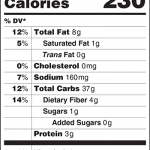Four years ago, the Institute of Medicine asked the FDA to set limits on sodium levels allowed in processed food. The FDA has still not acted on those recommendations. Excess sodium is linked to stroke, heart attack, and other health problems. The Center for Science in the Public Interest (CSPI) states that "if Americans had cut their sodium intake in half beginning in April 2010, as many as 400,000 lives might have been saved." CSPI health promotion policy director Jim O'Hara said, "FDA would probably act in a heartbeat if experts found that an unsafe drug or medical device was responsible for 100,000 deaths a year, but it is tolerating a deadly level of sodium in our food supply. While this Administration talks about the need for healthy eating, it is failing to pursue a policy that … [Read more...]
Study: No Health Concerns in Food Tested for Acrylamide
A study conducted by the Canadian Food Inspection Agency found that some high carbohydrate foods did not have acrylamide levels at levels that "would be considered unsafe for consumption." The agency tested 897 high carb food samples from Canadian retail stores, including dried fruits and vegetables, crackers, condiments, soup powder, taco seasonings, molasses, syrups, adult and infant breakfast cereals, and nut butters. The lowest levels of acrylamides were observed in jams, while the highest average acrylamide levels were found in molasses, at 901 ppb. Acrylamides are chemicals used for industrial purposes, used to make paper, dyes, and plastics. The chemical is formed in foods heated to temperatures above 248°F. The foods that produce the most acrylamides are potato chips and French … [Read more...]
New Study Questions Saturated Fat Heart Disease Link
A new study published in the Annals of Internal Medicine questions the information the public has been told about a link between saturated fat intake and heart disease risk. The study, called "Association of Dietary, Circulating, and Supplement Fatty Acids with Coronary Risk" is a meta analysis and review of studies conducted over the years and published in peer review journals. The authors of the study did find a link between trans fats intake and heart disease. Trans fat is a "fake" fat that is made by bubbling hydrogen through oil to produce a solid product. It has been used for years in commercial products. But they did not find evidence of dangers from saturated fat, the types of fats found in dairy and meat products. They also looked at possible benefits to eating foods rich in … [Read more...]
CDC Says Childhood Obesity Rates Declining
The Centers for Disease Control and Prevention (CDC) has sent out a press release stating that obesity prevalence for children aged 2 to 5 years has declined from 14% in 2003-2004 to just over 8% in 2011-2012. That is a decline of 43% based on the National health and Nutrition Examination Survey (NHANES) data. Dr. Tom Frieden, CDC Director, said in a statement, "we continue to see signs that, for some children in this country, the scales are tipping. This report comes on the heels of previous CDC data that found a significant decline in obesity prevalence among low-income children aged 2 to 4 years participating in federal nutrition programs." The reasons for the decline aren't clear, although child care centers are trying to improve their nutrition and physical activity standards. … [Read more...]
FDA Proposes Changes to Nutrition Labels
The FDA is changing nutrition labels put on all food packages. The box is going to have new design and new content. Michael Landa, director of FDA's Center for Food Safety and Applied Nutrition said, "Obesity, hearty disease and other chronic diseases are leading public health problems. The proposed new label is intended to bring attention to calories and serving sizes, which are important in addressing these problems. Further, we are now proposing to require the listing of added sugars." One of the changes is larger and bolder type on calories. The number of servings per package is going to be more prominent. Too often, small packages seem like they only contain one serving. Consumers have to look more closely to see how many servings actually deliver the calories on the label. … [Read more...]
Research Suggests Grilled Meat Tied to Higher Risk of Disease
New research published in the journal Proceedings of the National Academy of Sciences has found that grilled meats, which are high in compounds called advanced glycation end products (AGEs), may be a risk factor for developing Alzheimer's and diabetes. When meats and other protein and fat-rich foods are cooked at high temperatures, these compounds form. AGEs contribute to oxidant stress and inflammation in the body. The scientists at the Icahn School of Medicine in New York studied AGE levels in humans over the age of 60. Over a nine month time frame, those with a high AGE blood level developed signs of insulin resistance, sirtuin suppression, and cognitive decline. Sirtuin is a compound that is a natural defense against both Alzheimer's disease and metabolic syndrome, which is a … [Read more...]
New FDA Rules for Infant Formula
The FDA just published a new interim rule about infant formula. It sets standards for manufacturers to ensure that they produce safe formula that supports healthy growth. The rule, along with two draft guidance documents for industry, was published on February 6, 2014. Since 25% of all infants are never breast fed, and by three months, two-thirds are consuming some infant formula, this rule is crucial. Infants who do not have any medical or dietary problems should be able to grow and thrive on any infant formula marketed in the United States. Michael Taylor, the FDA's deputy commissioner for foods and veterinary medicine said in a statement, "many families rely on infant formula as either the sole source of nutrition or an integral part of an infant's diet through 12 months of age. … [Read more...]
Fish Oil Craze Wiping Out Rare Shark
The health craze for consuming fish oil, which is rich in omega-3 fatty acids, is wiping out the whale shark, a rare species that is vulnerable to extinction. The sharks eat plankton and grow up to 40 feet long. These fish are the biggest fish and shark in the world and are very gentle, and are an internationally-protected endangered species. A factory in China slaughters 600 whale sharks every year, and exports at least 300 tons in oil from the shark livers. An organization in Hong Kong called Wild Life Risk has issued a report about that Chinese factory, located in Zhejiang Province. The agency's investigation ended in December 2013, and they issued their report January 27, 2014. The products from this shark are being sold internationally "in contravention of CITES (the Convention … [Read more...]
CDC Wants Restaurants to Reduce Sodium Content
The Centers for Disease Control and Prevention (CDC) wants restaurants to lower the sodium content of the foods they offer. The agency just issued a report called "From Menu to Mouth: Opportunities for Sodium Reduction in Restaurants", which was published in CDC's journal, Preventing Chronic Disease. Americans eat out, either at fast food or dine-in restaurants, four or five times a week. And just one of those meals can contain more than an entire day's recommended amount of sodium for an adult, which is about 2,300 milligrams. On average, fast food meals have 1,848 mg of sodium per 1,000 calories. Foods served in dine-in restaurants have 2,090 mg of sodium per 1,000 calories. Foods obtained in restaurants contributed to 24.8% of the sodium consumed in this country during 2007 to … [Read more...]
U.S. 21st in Oxfam Food Systems Ranking
The United States ranks 21 in the world in Oxfam's ranking of the world's food systems. One hundred twenty-five countries were judged according to food quality, abundance, affordability, and the eating habits of its citizens. Obesity and high diabetes rates were two of the issues that lowered the U.S. score. We rank behind 20 European countries and Australia. The best country in the world for food systems, according to the report, is the Netherlands. France and Switzerland tied for second, while Denmark, Sweden, Austria and Belgium tied for third place. The worst country in the ranking is Chad, right below Ethiopia and Angola. The U.S. had the best score for food affordability, and tied with Australia for fourth place for food quality. The report states, "around the world, one in … [Read more...]













